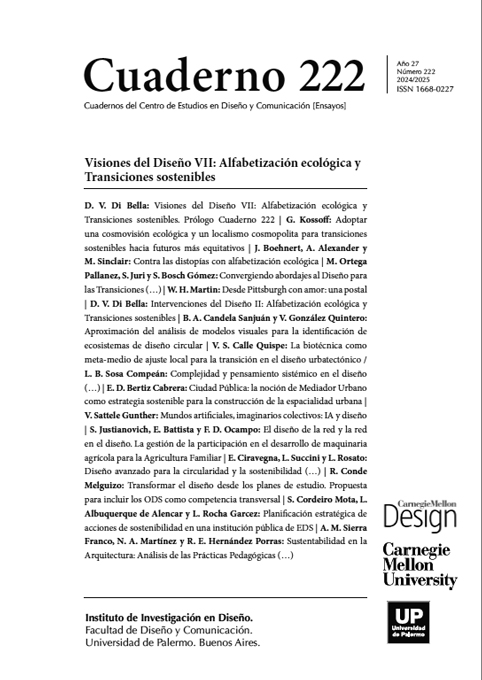Embracing an ecological worldview and cosmopolitan localism for sustainable transitions toward more equitable futures
Resumen
Este documento presenta tres estrategias clave para la transición de las sociedades del siglo XXI hacia futuros más sostenibles, equitativos y deseables a largo plazo.
Citas
Berman, M. (1981). The Reenchantment of the World. Ithaca, NY: Cornell University Press.
Boehnert, J. (2018). Design, Ecology and Politics: Towards the Ecocene. London, UK: Bloomsbury.
Bookchin, M (2015). The Next Revolution: Popular Assemblies and The Promise of Direct Democracy. London, UK, Verso.
Capra, F. and Luisi, P. L (2014). The Systems View of Life: A Unifying Vision. Cambridge, UK: Cambridge University Press.
Capra, F. (1984). The Turning Point: Science, Society and the Rising Culture.
Ceschin, F. and Gaziulusoy, I. (2020).
Clayton, P, Archie, K., Sachs, J and Steiner, E. (2021). Envisioning an Ecological Civilization. In The New Possible: Visions of Our World Beyond Crisis. Eugene, OR: Cascade Books.
De Young, R. and Princen, T. (2012). The Localization Reader: Adapting to the Coming Downshift. Boston, MA: MIT Press.
Delanty, G. (2009). The Cosmopolitan Imagination: The Renewal of Critical Social Theory. Cambridge, UK: Cambridge University Press.
Hopkins, R. (2011). The Transition Companion: Making Your Community More Resilient in Uncertain Times. White River Junction: Chelsea Green.
Irwin, T. (2011). Wicked Problems and the Relationship Triad. In Grow Small, Think Beautiful: Ideas for a Sustainable World from Schumacher College ed. Stephan Harding. Edinburgh, UK: Floris Books, pp. 232-257.
Irwin, T. (2019). The Emerging Transition Design Approach. Cuaderno Journal 73: Transition Design Monograph. University of Palermo, Argentina. pp. 51-66.
Irwin, T. and Kossoff, G. (2021a). About Transition Design, Transition Design Seminar (Website: https://transitiondesignseminarcmu.net/classes-2/introduction/ Accessed Feb. 2024).
Irwin, T. and Kossoff, G. (2021b). Wicked Problems: Anatomy and Dynamics, Transition Design Seminar Website: (https://transitiondesignseminarcmu.net/classes-2/mappingwicked-problems/ Accessed Feb. 2024).
Irwin, T. and Kossoff, G. (2021c). Designing Systems Interventions, Transition Design Seminar (Website: https://transitiondesignseminarcmu.net/assignments/#1515159007205-8d57b764-12c3 Accessed Feb. 2024).
Irwin, T. and Kossoff, G. (2024). Wicked Problem Resolution as a Strategy for Catalyzing Positive, Systems-Level Change. In Rachel Beth Egenhoefer (ed.) Routledge Handbook of Sustainable Design, 2nd edition. Abingdon, UK: Routledge.
Jacobs, J. (1992). The Death and Life of Great American Cities. New York, NY: Vintage.
Jepson, P. and Blythe, C. (2022). Rewilding: The Radical New Science of Ecological Recovery. Boston, MA: MIT Press.
Kossoff, G. (2019). Cosmopolitan Localism: The Planetary Networking of Everyday Life. Cuaderno Journal 73: Transition Design Monograph. University of Palermo, Argentina. pp. 51-66.
Kossoff, G. (2011). Holism and the Reconstitution of Everyday Life: A Framework for Transition to a Sustainable Society. In Grow Small, Think Beautiful: Ideas for a Sustainable World from Schumacher College ed. Stephan Harding. Edinburgh, UK: Floris Books, pp.122-142.
Kossoff, G. and Irwin T. (2022). Transition Design as a Strategy for Addressing Urban Wicked Problems. In Cities After Capitalism. Abingdon, UK: Routledge, pp.90-102.
Maffi, Luisa (ed.) (2001). On Biocultural Diversity: Linking Language, Knowledge and the Environment. Washington, D.C: Smithsonian.
Manzini, E. (2011). SLOC: The Emerging Scenario of Small, Open, Local, Connected. In Grow Small, Think Beautiful: Ideas for a Sustainable World from Schumacher College ed. Stephan Harding. Edinburgh, UK: Floris Books, pp. 216-231.
Merchant, Carolyn (1990). The Death of Nature: Women, Ecology and the Scientific Revolution. HarperOne. San Francisco, CA: HarperOne.
Mumford, L. (1974). The Pentagon of Power: The Myth of the Machine, Vol. 2. New York, NY. Harcourt, Brace, Jovanovich.
Nelson, K and Shilling, D. (ed.) (2018). Traditional Ecological Knowledge: Learning from Indigenous Practices for Environmental Sustainability. Cambridge, UK: Cambridge University Press.
Norberg Hodge, Helena. 2016. Localization: Essential Steps to an Economics of Happiness., Totnes, UK: Local Futures/ISEC.
Rittel, H. and Webber, M (1973). Dilemmas in a General Theory of Planning. Springer: Policy Sciences, Vol. 4, No. 2 (Jun. 1973), pp. 155-169.
Sachs, W. (1999). Planet Dialectics: Explorations in Environment and Development. London, UK: Zed Books, pp. 105-107.
Scott, J.C (2020). Seeing Like a State: How Certain Schemes to Improve the Human Condition Have Failed. New Haven, CT: Yale University Press.
Shiva, V. and Mies, M. (2014). Ecofeminism. London, UK: Zed Books.
Speth and Courier (2021). The New Systems Reader: Alternatives to a Failed Economy.
Tarnas, R. (1993). The Passion of the Western Mind: Understanding the Ideas that Have Shaped Our World View. New York, NY: Ballentine Books.
Watson, J. (2020). Lo-Tek: Design by Radical Indigenism. Cologne, Germany: Taschen.
Los autores/as que publiquen en esta revista ceden los derechos de autor y de publicación a "Cuadernos del Centro de Estudios de Diseño y Comunicación", Aceptando el registro de su trabajo bajo una licencia de atribución de Creative Commons, que permite a terceros utilizar lo publicado siempre que de el crédito pertinente a los autores y a esta revista.


